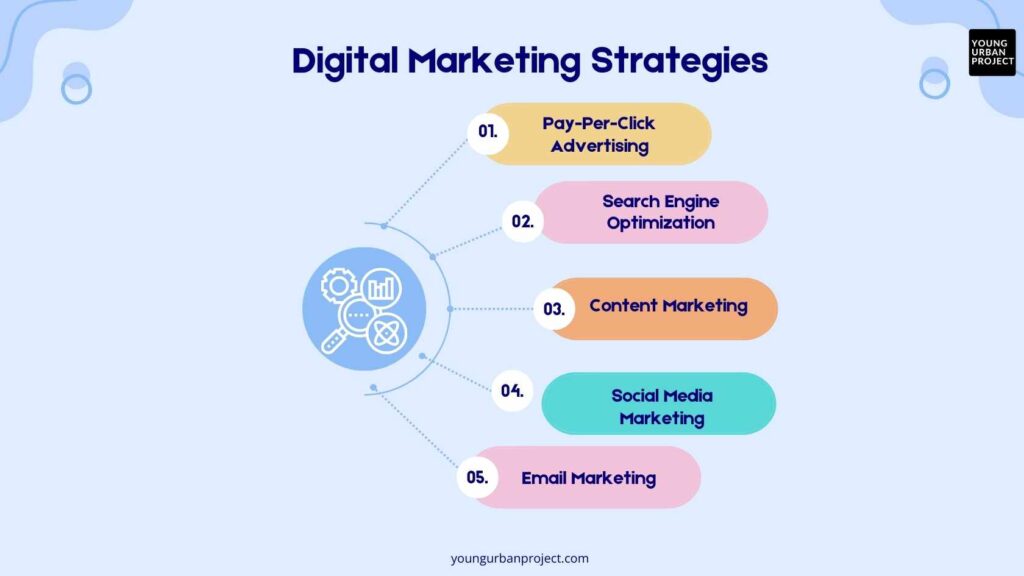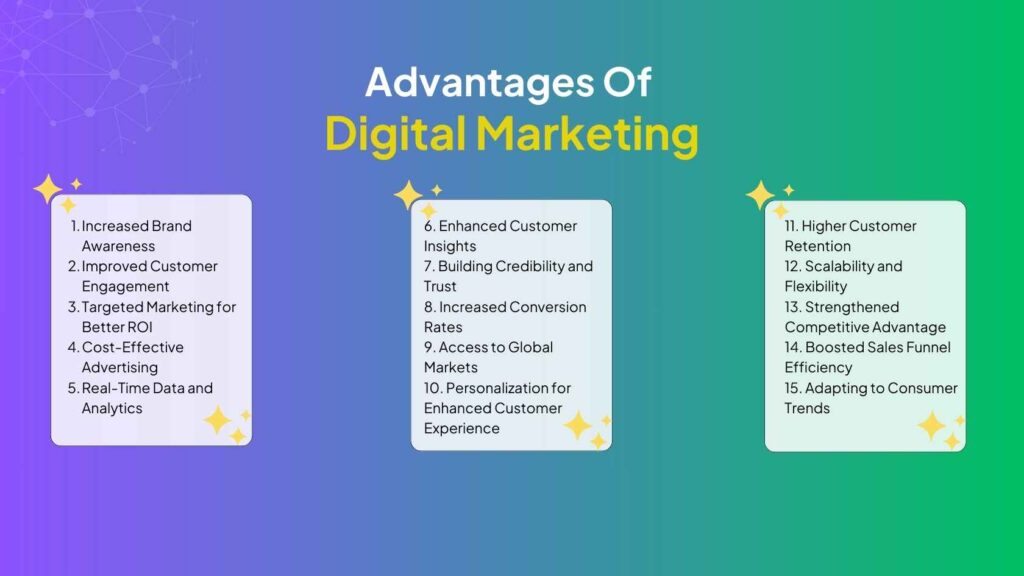When it comes to growing your business, the word “marketing” often evokes thoughts of flashy ads and catchy slogans. However, the advantages of digital marketing go far beyond mere promotion; they can shape the very foundation of your business strategy and future. In a world where competition is fierce and consumer preferences shift daily, understanding and leveraging marketing can mean the difference between thriving and merely surviving.
Marketing isn’t just about selling a product or service; it’s about creating connections, building relationships, and providing value. In this blog, we will explore the multifaceted world of digital marketing, detailing its various elements, the significant advantages it offers, and how to effectively choose the best strategy and channels for your business.
Table of Contents
What is Digital Marketing?
Digital marketing refers to the strategies and techniques used to promote products and services through digital channels. These channels encompass a wide range of platforms, including search engines, social media, email, websites, and mobile applications. And unlike traditional marketing, which primarily relies on print ads, TV commercials, and billboards, digital marketing leverages the Internet’s capabilities to reach a broader audience more efficiently and effectively.
So, at its core, digital marketing revolves around two key components: understanding your audience and delivering tailored messages that resonate with them. This approach enables businesses to foster relationships with customers, encourage engagement, and drive conversions. As consumers increasingly turn to online platforms for their shopping needs, businesses that embrace digital marketing are better positioned to meet their customers where they are.
Also Read: The Scope of Digital Marketing
Digital Marketing Strategies

- Pay-Per-Click Advertising (PPC)
PPC is a digital advertising model that allows businesses to pay for clicks on their ads, which can include text, images, and videos. This strategy is commonly utilized across various platforms, including search engines, social media, and websites. - Search Engine Optimization (SEO)
SEO involves enhancing a website’s technical aspects, creating effective content, and building quality backlinks to improve its visibility and rankings in search engine results. The goal is to attract more organic traffic by ensuring the site is easily discoverable. - Content Marketing
This strategy focuses on producing valuable content—such as blogs, articles, white papers, videos, and podcasts—to attract and engage an audience. Unlike direct advertising, content marketing seeks to draw potential customers in by providing helpful and interesting information. - Social Media Marketing
Social media marketing complements content marketing by creating engaging posts, videos, and images to connect with audiences. This approach fosters interaction and community building and can leverage both organic and paid content strategies. - Email Marketing
Email marketing involves reaching out directly to customers—both current and former—via email. This strategy can be used to promote products, share valuable content, offer discounts, and keep subscribers informed about business updates, such as new locations or changes in hours.
The best thing about digital marketing is its flexibility and adaptability. The key to success depends on understanding your business needs and matching your objectives and goals with the right digital marketing strategies.
Also Read: 10 Digital Marketing Objectives to Skyrocket Your Business Growth
Top 15 Advantages of Digital Marketing

1. Increased Brand Awareness
Brand awareness is the foundation of all marketing efforts. Without it, potential customers won’t know you exist. An effective marketing strategy helps your business reach a larger audience, making your brand recognizable and memorable. Digital platforms, such as social media and search engines, enable businesses to increase their visibility more efficiently than ever before.
According to a report, 70% of brand managers consider building an audience more important than converting sales immediately. This highlights the long-term value of awareness campaigns in building a sustainable customer base.
2. Improved Customer Engagement
Marketing isn’t just about broadcasting messages; it’s about building two-way communication with your customers. Engaging customers through personalized content, social media interactions, and targeted ads helps foster relationships and increase customer loyalty. Businesses that are responsive to their customers’ needs and feedback tend to have higher retention rates.
3. Targeted Marketing for Better ROI
One of the greatest advantages of digital marketing is its ability to target specific audiences. Using tools like Google Ads, Facebook Ads, and other digital platforms, businesses can hone in on their ideal customers based on demographics, interests, behaviors, and more. Targeted marketing ensures that every dollar you spend works harder by reaching those most likely to be interested in your products or services.
4. Cost-Effective Advertising
Traditional marketing methods such as TV, radio, and print ads can be costly, often out of reach for small businesses. In contrast, digital marketing offers much more cost-effective solutions. With options like pay-per-click (PPC) advertising, social media marketing, and content creation, businesses of all sizes can launch campaigns that fit their budgets.
5. Real-Time Data and Analytics
One of the key advantages of digital marketing is the ability to measure and analyze performance in real-time. With tools like Google Analytics, you can track website traffic, customer behaviour, conversion rates, and more. This data-driven approach allows businesses to optimize their marketing strategies continually.
6. Enhanced Customer Insights
Through marketing, businesses can gain valuable insights into customer behaviour and preferences. By analysing data from digital platforms, companies can understand what motivates their customers to buy and tailor their strategies accordingly. This insight not only improves targeting but also enhances product development and customer service efforts.
7. Building Credibility and Trust
Effective marketing establishes your brand as an authority in your industry. Content marketing, in particular, allows businesses to share valuable, informative content that educates and helps consumers. When customers see you as a trusted source of information, they’re more likely to trust your products or services.
8. Increased Conversion Rates
Marketing drives conversions, turning visitors into leads and leads into paying customers. Whether through SEO, PPC, email campaigns, or social media ads, well-executed marketing strategies increase the chances of converting prospects. The more targeted and relevant your marketing efforts are, the higher your conversion rates will be.
9. Access to Global Markets
Thanks to digital marketing, businesses are no longer limited to local audiences. Marketing online enables companies to expand their reach to global markets with ease. Whether you’re selling products or services, digital platforms provide access to potential customers across continents.
10. Personalization for Enhanced Customer Experience
Personalization is a major trend in marketing, and it can greatly enhance the customer experience. From personalized emails to tailored product recommendations, businesses can now deliver individualized experiences to customers, making them feel valued and understood.
11. Higher Customer Retention
Marketing isn’t just about acquiring new customers—it’s also about keeping existing ones. Through strategies like email marketing, loyalty programs, and re-targeting ads, businesses can keep their customers engaged and coming back for repeat purchases. Retention is often more cost-effective than acquiring new customers, making this a significant advantage of marketing.
12. Scalability and Flexibility
Digital marketing is highly scalable and adaptable. Whether you’re running a small local business or a large multinational corporation, marketing strategies can be adjusted to suit your budget, goals, and audience size. This flexibility ensures that you can scale your campaigns as your business grows, without needing a massive budget upfront.
13. Strengthened Competitive Advantage
Marketing allows businesses to differentiate themselves from competitors. By focusing on your unique selling proposition (USP) and consistently communicating your brand’s value, you create a competitive advantage. Whether through superior customer service, innovative products, or engaging content, marketing helps highlight what sets your business apart.
14. Boosted Sales Funnel Efficiency
The marketing funnel is a crucial element in driving customers from awareness to conversion. With a comprehensive marketing strategy, businesses can nurture leads through every stage of the funnel—whether it’s through top-of-the-funnel content, email nurturing, or bottom-of-the-funnel sales pages. Effective marketing streamlines this process, moving prospects down the funnel more efficiently.
15. Adapting to Consumer Trends
One of the most significant advantages of digital marketing is its agility. Marketers can quickly adapt their strategies based on shifting consumer behavior, industry trends, or new technologies. This adaptability ensures that businesses stay relevant and maintain a competitive edge in ever-changing markets.

How to Choose the Best Strategy and Channel
Choosing the right marketing strategy and channels is essential for maximizing the advantages of marketing. Here are some steps to guide your decision-making process:
1. Understand Your Audience
Before selecting a strategy, it’s crucial to understand your target audience. Conduct thorough market research to identify their demographics, preferences, and behaviours. The more you know about your audience, the better you can tailor your marketing efforts to meet their needs.
2. Define Your Goals
Clearly define your marketing goals. Are you looking to increase brand awareness, generate leads, or boost sales? Having specific, measurable goals will help you choose the right strategies and channels to achieve them.
3. Analyze Your Competition
Conduct a competitive analysis to understand what strategies and channels your competitors are using. Identify gaps in their approach that you can capitalize on and differentiate your brand.
4. Choose the Right Channels
Select the marketing channels that align with your audience and goals. For example, if your target audience is active on social media, consider investing in social media marketing. If you’re focused on generating leads, email marketing and content marketing may be more effective.
5. Test and Measure
Implement your chosen strategies and continuously monitor their performance. Use analytics tools to track key metrics and adjust your approach as needed. Testing different strategies will help you identify what works best for your business.
6. Stay Adaptable
The digital marketing landscape is constantly evolving, so it’s essential to stay adaptable. Keep up with industry trends and be open to trying new strategies and channels. Flexibility will allow you to respond effectively to changes in consumer behavior and market conditions.
Conclusion
The advantages of marketing are undeniable and play a crucial role in the success of any business. By adopting digital marketing, businesses can increase brand awareness, engage with customers, and drive sales effectively. Understanding the various elements of digital marketing and how to choose the right strategies and channels will empower businesses to thrive in an increasingly competitive landscape.
Whether you are a small startup or an established enterprise, leveraging the advantages of marketing can lead to sustainable growth and lasting success. Start exploring the possibilities today and unlock the potential that effective marketing holds for your business.

